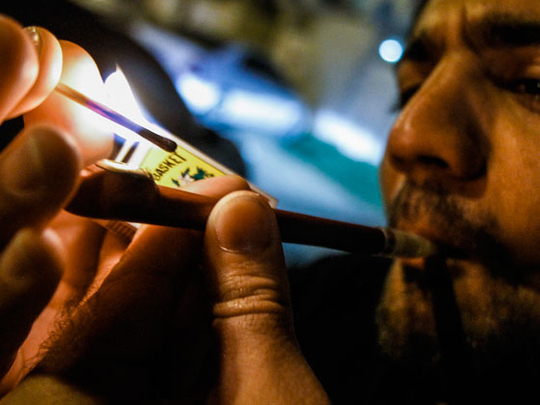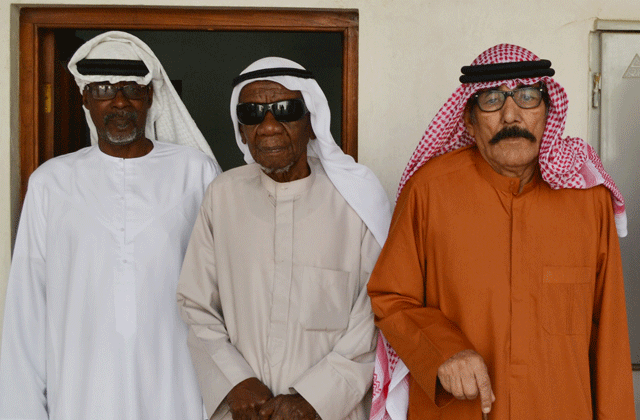
Dubai: As UAE health authorities implement tougher strategies against smoking to reduce the harmful effects of tobacco use, a traditional small pipe used to smoke tobacco is staging a disturbing comeback — more so because most new users fall in the youth segment.
The sight of Emirati youth smoking medwakh — a slender, six-inch-long pipe — is becoming increasingly common in the UAE. In fact, medwakh, which was earlier known only to people in the GCC, is becoming a fad among young users from other Arab countries and even the West.
The medwakh, smoked by fishermen and Bedouins in the UAE in the past, uses a traditional Arabic tobacco called dokha.
“There are three varieties of dokha ‘bared’ [cold] ‘har’ [hot] and ‘wasat’ [in between] and it refers to the harshness of the tobacco, the hotter the dokha the bigger the effect,” said M.G, an Iranian national who has been working at a popular medwakh shop in Abu Dhabi since 1994. “The tobacco leaves plucked from the top of the hoot tree are used to make bared dokha, the ones from the middle are used to make the wasat dokha and the leaves at the very bottom are used to make the har dokha. The more mature the leaf, the stronger the flavour,” he said.
“Growing dokha in the UAE is illegal so we get it from Oman,” he added.
“The average cost of dokha ranges from Dh20 to Dh30 and the average cost of medwakh ranges from Dh30 to Dh80. The medwakh can cost up to Dh500 if it is customised to customers’ specific needs, such as certain measurements, carvings and quality of wood requested. Medwakh made out of elephant tusks can cost more than Dh1,000, however it is now banned in the UAE.”
To learn more about old medwakh habits, Gulf News visited the Eyal Nasir Society for Arts and Traditional Heritage to speak to old Emirati fishermen, pearl divers and Bedouins who smoked medwakh in the 1930s and 40s.
“We used to smoke tobacco using coconut shells known as Nareen,” recalled 80-year-old-Juma Abdullah Saeed. “We would take the coconut shell, put it on the roof so it would dry, empty it and put the dokha inside and smoke it through a hole. Emiratis who lived next to the sea used seashells known as chooz — they would choose shells that were deep enough to put the tobacco, light it up and inhale it. We also smoked gadu which was exactly like a shisha as well as nshoog which was basically tobacco with cardamom and we would inhale it through our nose. Horns were also popular for making pipes,” he added.
“We used to make medwakh from deer and goat horns; we would put the tobacco inside the horn and smoke it. Later on it we started using animal bones like goat and sheep bones. We would put the tobacco from one side of the horn and smoke it from the other side, exactly like how you would do it in today’s medwakh that is made out of wood,” said Mohammad Bin Ali Al Mamari, 75, who started smoking medwakh when he was just eight way back in 1937.
Bedouin Abdullah Salem Sbeeb, 60, who made a living tending to palm trees and also worked in the honey industry, recalled his first taste of dokha. “I started smoking when I was 5, I would watch my dad smoke the dokha and once he was done, he would throw it away so I would secretly take it, re-light it and inhale,” he said. “Back then everyone used to smoke dokha and we didn’t even use a filter with it, the risks associated with it were not known.”
What used to be a small smoking device fashioned out of commonly found materials has now evolved to become a product sold at specialised dokha and medwakh shops where people can easily obtain various types of medwakh, dokhas and their accessories.
In fact, it has become so easy now that all one has to do to obtain their supply of dokha is to park their vehicle in front of the medwakh shop and honk their car’s horn. A salesperson will promptly come to the window of the car to take an order.
“I prefer going inside the shop instead of honking my car horn because I want to see what is new and explore my options,” said O.M, an Emirati business student studying at the American University of Sharjah who started smoking medwakh at the age of 16. “I started smoking medwakh out of boredom but nowadays I smoke it when I feel stressed or angry because it calms me down.”
Despite the fact that O.M. smokes medwakh eight times a day, he does not think that it is an addiction. “When I travel abroad for vacation I don’t have access to it and so I don’t smoke it for two months which is not a problem for me, this shows that I am not addicted,” he insisted.
Palestinian workshop engineer Ahmad Al Alami doesn’t mind admitting he’s hooked. “I first tried medwakh out of curiosity when I was 16 and I haven’t stopped ever since. I smoke it 10-12 times a day. I also find that medwakh helps in socialising as all my friends and I get together, share our dokha and socialise to pass time. I usually go to the medwakh shop once a week to obtain my weekly supply of dokha. It has become a weekly ritual and I admit that it has become an addiction.”
As for the money Al Alami spends on medwakh and dokha, he says “it is not a problem because I only spend Dh20 to Dh30 a week which is relatively inexpensive while if I was a cigarette smoker I would spend more than Dh100.”
The Medwakh clientele today has expanded to include women as well. But because of social taboos, female smokers refrain from smoking it in public.
Turkish external relations manager D.D, 22, spoke to Gulf News about being a female medwakh smoker. “I started smoking in school when I was 18 because all my friends were doing it as it was the new cool thing back then,” she recalls.
“Now I smoke it four to fivetimes a day and when I am in Turkey I make friends who are visiting get me dokha from the UAE. I know that smoking medwakh is not socially accepted for girls; in fact I myself do not like how it looks on a girl which is why I only smoke medwakh in private. I tried quitting as well but I found that when I attempted to quit it I started smoking more cigarettes so there was no point. I prefer medwakh over cigarettes because it does not cause you to reek of tobacco like cigarettes do, which is not very flattering for girls.”









